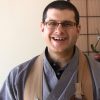Recommended books on the Precepts
Waking Up to What You Do (Rizetto)
The Mind of Clover (Aitken)
Wholehearted (Ellison)
Being Upright (Anderson)
The Heart of Being (Loori)
“Vast is the robe of liberation,
a formless field of benefaction;
I wear the Tathagata’s teaching,
saving all sentient beings.”
—GBZC Sutra Book
The Precepts of skillful action are the moral and ethical teachings of the Zen Buddhist tradition. You can find two Precepts recitations in our liturgy book.
The Precepts are not rules to be followed, but suggestions on how to navigate the difficult and messy business of being human in this human world. They describe how to fully actualize the absolute truth of interconnection and oneness in the relative of world of this and that. Moreover, the Precepts are among the Buddha’s clearest suggestions about how to find liberation right in the middle of our everyday lives.
We offer Precepts Discussion Groups two to three times a year. These usually meet weekly for twelve weeks. While there is no expectation that everyone in the group will want to formally receive the precepts, participation in such a discussion is a requirement for participating in the ceremony. Sessions missed in one discussion cycle may be made up in another.
The ceremony of formally receiving the precepts is called Jukai. People who have received the Precepts wear a rakusu (pronounced “rock-su”) during zazen, the black bib-like garment that is a miniaturized version of the Buddha’s robe, the robe of liberation. In this ceremony, each person receiving the precepts has the opportunity to read a sentence or three about each of the sixteen precepts. In this way, the ceremony is extremely powerful, communal, and inspiring. If possible, you should attend at least one Jukai ceremony before receiving them yourself. Most people sew their rakusu themselves. For more information, see Preparing for Jukai.
Receiving the Precepts is not something we do when we believe we will never act against them, but is itself an expression of our bodhisattva aspiration to return, again and again, to our intention to let Precepts guide our lives.
Jukai Ceremonies in which the precepts are received are scheduled on an “as needed” basis. (The most recent one took place on April 8, 2023.) All GBZC participants, as well as friends and family, are welcome to attend, to witness this important event!
Contact precepts@bostonzen.org for more information.
Our next Jukai ceremony at GBZC is scheduled for November 15th, 2014 at 4:30 PM.





